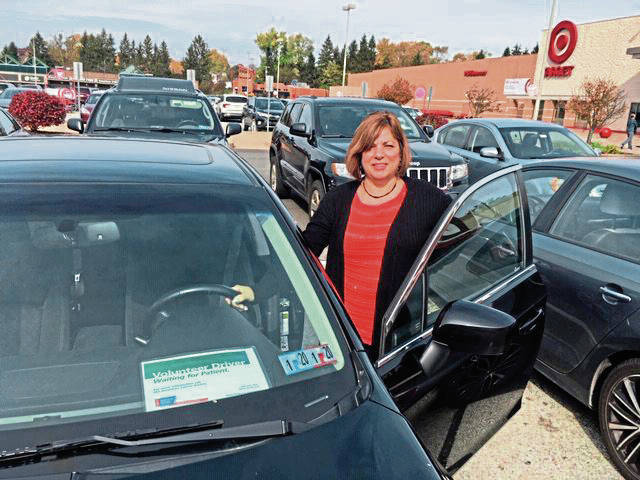Irwin cancer survivor drives patients to treatments, recovery through American Cancer Society
Cheryl Kilroy admits she has followed the same road many Western Pennsylvanians regrettably are forced to take after a cancer diagnosis.
A 16-year cancer survivor, the Irwin resident knows firsthand that one of the biggest roadblocks to treatment can be transportation. For the past 15 years, after her own treatment, she has volunteered with “Road to Recovery” — the American Cancer Society program that offers free rides to cancer patients without transportation or who cannot drive themselves to treatment.
The program helps to remove a barrier many cancer patients and their caregivers say impedes their ability to receive quality health care, said Dan Tobin, spokesman for the American Cancer Society’s regional office in Pittsburgh.
Kilroy considers herself blessed and said she has forged friendships through driving patients.
“I wish I had known about the Road to Recovery program when my sisters and I were caring for my mother in 2004,” Kilroy said. “She needed daily rides for radiation. Many times, getting her there would require taking off work and rearranging our own appointments and child care for my sisters and I. … We were raising a combined five kids at the time.”
In 2003, Kilroy was diagnosed with synovial sarcoma, a soft-tissue bone cancer. Within a year, the mother of three — then ages 19, 21 and 23 — went through five surgeries, eight months of chemotherapy and six weeks of radiation.
In 2004, she and her sisters balanced daily lives with caring for their mother, Velma Coll, who also had cancer. Coll, who lived in Level Green, died that year.
Her oldest sister, Marylou Ginsburg, also of Level Green, died of cancer in 1998.
“My older sister did a lot of volunteering throughout the community, so I do this in memory of her, too,” Kilroy said.
She realizes driving can make a big impact on cancer patients.
“Not having to worry about how they are going to get to their treatments can relieve a lot of stress for the patients and their families. Plus, as a survivor myself, I hope I am able to provide good companionship along the way,” Kilroy said.
For about five years, Kilroy drove a Fayette County woman to chemotherapy treatments. She now is a cancer survivor who is still undergoing medical treatment.
“Cheryl was so nice. … I don’t know what I would have done without her,” said the woman, who asked that her name not be used. “She was really helpful and considerate and knew what I was going through.”
About 100 volunteers drive in the Allegheny, Beaver, Butler, Washington and Westmoreland region, said Teresa Segelson, the American Cancer Society’s mission delivery program manager. “But there is always a need for drivers.”
Volunteers must have a valid driver’s license, a good driving record, proof of insurance and a dependable vehicle, Tobin said. Access to a computer and availability on a flexible Monday-through-Saturday schedule also is needed, he said.
Kilroy has not kept track of how many people she has shuttled to appointments over the years.
“Some of the rides I’ve taken have been 15-minute trips right in Irwin here, and some have lasted several hours. I’ve driven people as young as 18 years old and as old as 95 years old,” she said.
“No matter how long our time is together, it’s always a rewarding experience,” she said.
Kilroy believes the experience can be helpful for riders, too.
“I think sometimes it can be reassuring to have someone who has gone through the treatments themselves to speak with. But if a person doesn’t want to talk and just wants to relax and listen to music, we do that, too,” Kilroy said.
She said the cancer society also fits the driving schedules to her schedule.
With three adult children, she often cares for five grandchildren. She also waits tables part time at Cenacolo Restaurant in North Huntingdon.
“Your schedule can change as your own life circumstances change,” she said.
“Volunteering for this program has been a perfect way for me to give my time without always having to make a huge commitment,” Kilroy said. “Whether I’ve driven patients several times per week or only once or twice per month, I know that I am making a difference.”
To learn more about becoming a volunteer driver for the Road to Recovery program, visit cancer.org/drive or call 1-800-227-2345. Patients who need rides should call 1-800-227-2345 at least three days in advance. More information is also available at www.cancer.org.
Remove the ads from your TribLIVE reading experience but still support the journalists who create the content with TribLIVE Ad-Free.

